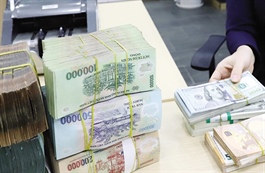Banks race to divest financial stakes
Banks race to divest financial stakes
Foreign banks and investors are projected to deepen their foothold in Vietnam’s consumer credit market, driven by low penetration rates compared to the region, favourable policies, and the evolving attitudes of a new generation of borrowers.

Banks race to divest financial stakes, Photo: Le Toan |
On December 30, the State Bank of Vietnam approved the transfer of all SeABank’s equity in Postal Financial Company to Aeon Financial.
This significant transaction in the consumer finance sector, valued at approximately $180 million, was completed more than a year after the equity transfer agreement was signed in October 2023.
According to SeABank, the divestment is part of its strategy to restructure capital resources.
“This is a critical component of the roadmap approved by SeABank, aimed at restructuring capital resources, strengthening financial capacity, scaling operations, investing in technology, and fostering business growth towards sustainability, as the bank moves closer to its goal of becoming the most preferred retail bank,” said a SeABank representative.
Nguyen Quoc Hung, general secretary of the Vietnam Banks Association, said, “Consumer lending in Vietnam remains an extremely promising market. Despite temporary challenges, the sector still has considerable room for growth. As such, investors with strong financial capacity remain confident in the market’s prospects and the government’s policies, continuing to invest in this field.”
Amid the optimistic outlook on notable mergers and acquisitions in Vietnam’s consumer lending market in recent years, doubts linger over whether financial companies are seen as burdensome by their parent banks while remaining highly coveted by foreign investors eager to buy.
Tran Kieu Oanh, head of Financial Services Analysis at FiinGroup, noted a rise in independent financial companies within the consumer finance market, as banks continue to divest. Over the past five years, the proportion of bank-affiliated financial companies has decreased from 65.3 to 59.1 per cent, paving the way for strong foreign investment.
“With changing credit conditions and ongoing transfer trends, Vietnamese financial companies face opportunities for restructuring and enhancing competitiveness by partnering with foreign entities. This presents a significant opportunity for foreign investors while helping local financial companies improve governance and foster sustainable development,” said Oanh.
Before SeABank, the market witnessed several divestments by banks from financial companies, forecasting a continued surge in dealmaking activity within the consumer finance sector.
Thailand’s fintech giant SCB X has also revealed plans to complete its acquisition of Home Credit Vietnam in the first half of 2025, following regulatory approval. This acquisition, valued at nearly $900 million, was announced in 2023.
Arthid Nanthawithaya, CEO of SCB X, described the acquisition as a milestone in its journey towards becoming a top fintech group in the region.
“This strategic move strengthens SCB X’s presence in Southeast Asia, enhances shareholder value, and delivers long-term profits. Vietnam, with its dynamic economy and tech-savvy population, is a key strategic market for SCB X. This acquisition marks the beginning of our expansion here,” Nanthawithaya said.
Home Credit Vietnam’s 15 million customers, extensive network of 14,000 retail points, and experienced management team will provide a solid foundation for SCB X’s presence in Vietnam, contributing to the group’s net profit immediately upon completion, he added.
At the end of 2024, SHB announced that Krungsri Bank, a member of Japan’s MUFG, had proposed to acquire the remaining 50 per cent charter capital of SHB Finance ahead of schedule.
SHB then announced the resolution approving the transfer of this capital stake in accordance with the agreement signed with Krungsri, marking the second phase of the transaction.
For banks, selling financial companies achieves multiple objectives, including generating significant capital to enhance financial strength and risk-sharing.
“The transfer of equity to Krungsri will bring significant surplus value to SHB shareholders, creating additional resources to strengthen the bank’s financial capacity and foundational factors, thereby boosting business operations in key segments, particularly through increased investment in digital transformation. The surplus from the deal also becomes a springboard for SHB to improve financial indicators dramatically,” said Do Quang Vinh, deputy CEO of SHB.
The State Bank of Vietnam in July 2024 stipulated that loans under $4,200 do not require borrowers to provide detailed plans for capital use, only basic information on the loan purpose and repayment ability. This regulation simplifies procedures and stimulates borrowing.
In 2025, consumer credit is expected to surge, supported by several favourable factors. According to MB Securities, the economic recovery, driven by strong GDP growth and improved household incomes, is projected to significantly increase demand for consumer finance.
“Consumer lending demand is forecast to continue growing strongly, potentially by around 15 per cent. This is why many domestic banks have frequently revealed plans to acquire financial companies. On the other hand, foreign investors have also shown significant interest in Vietnam’s consumer finance market. As a result, dealmaking activities in this sector are expected to remain vibrant in the future,” said an MB Securities analyst.

























